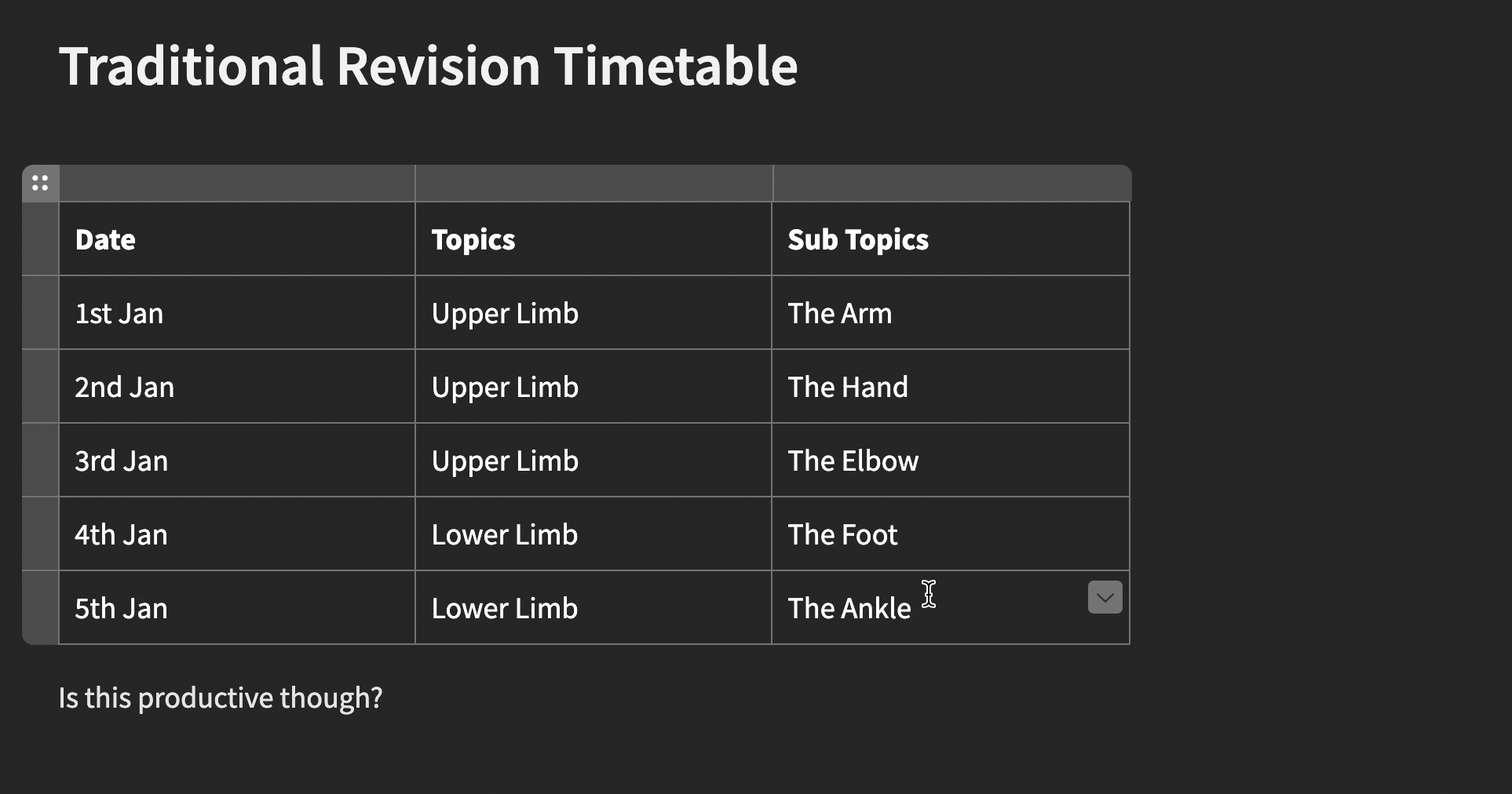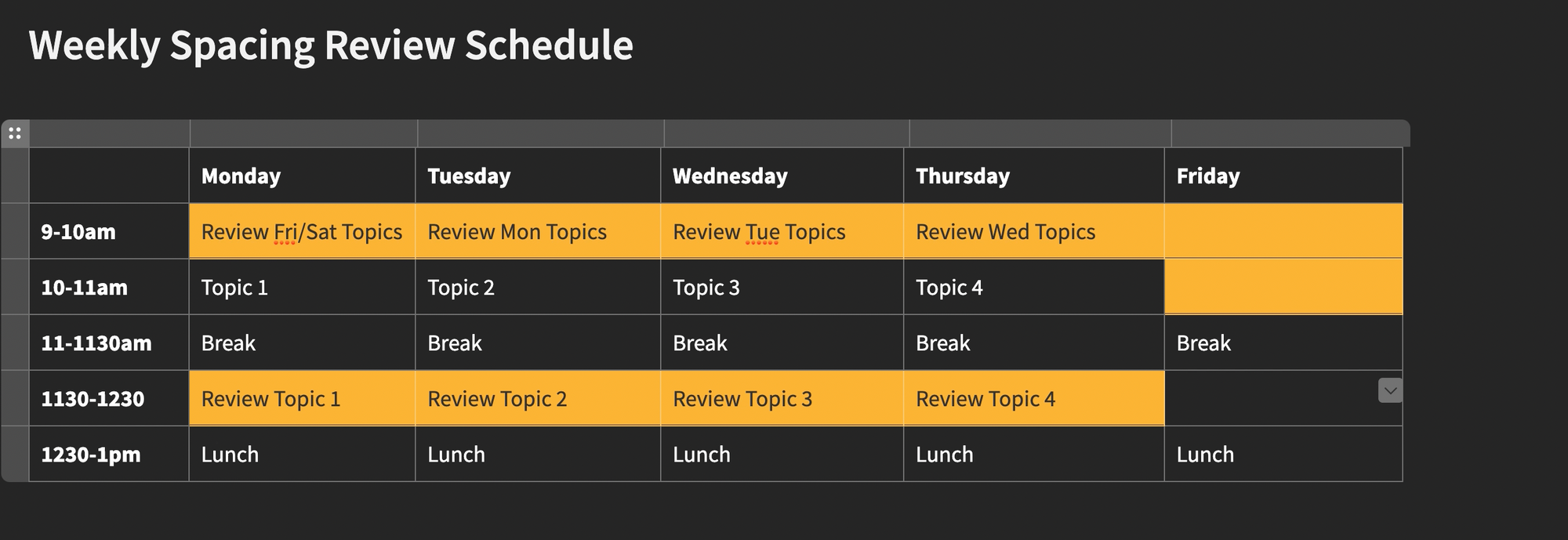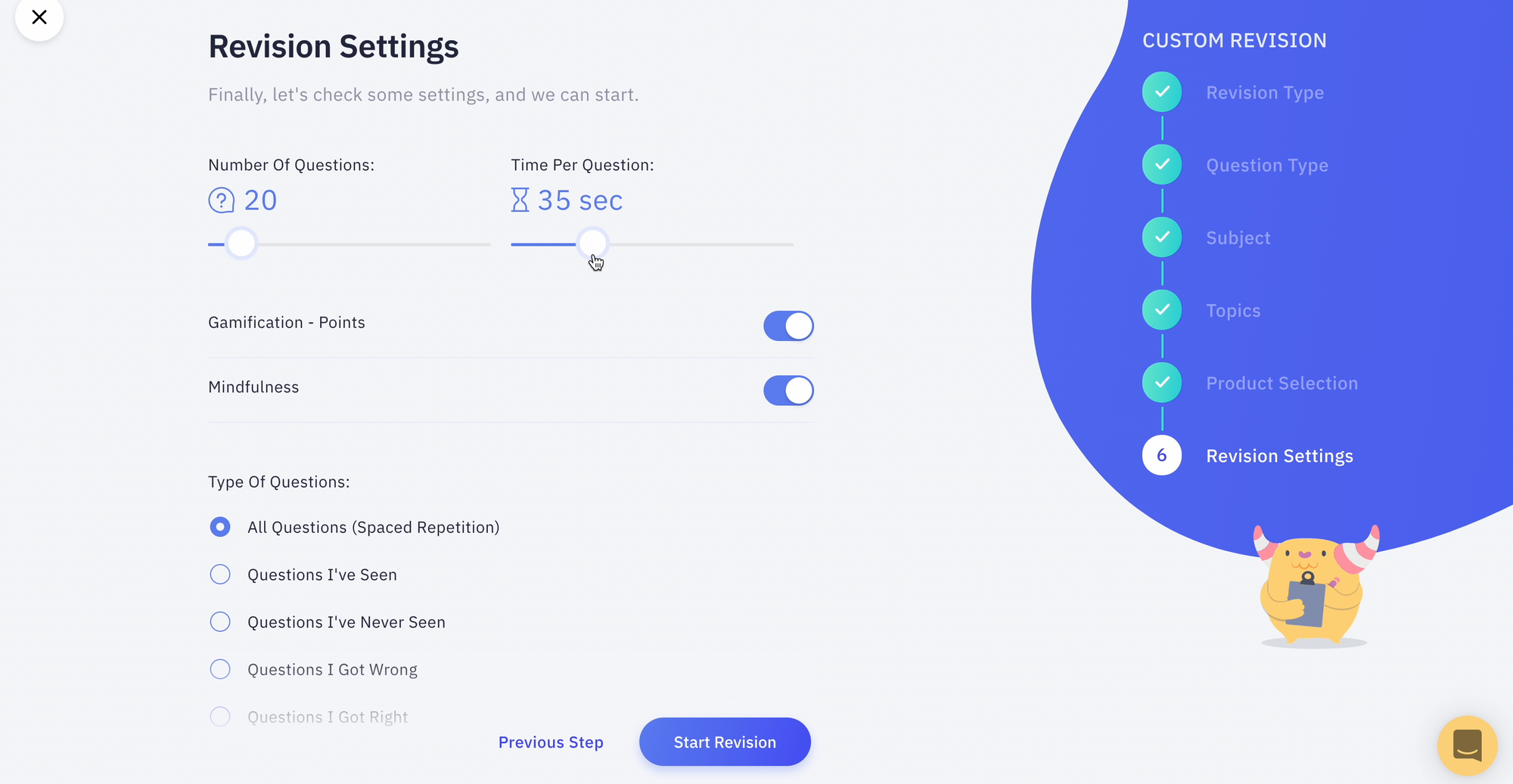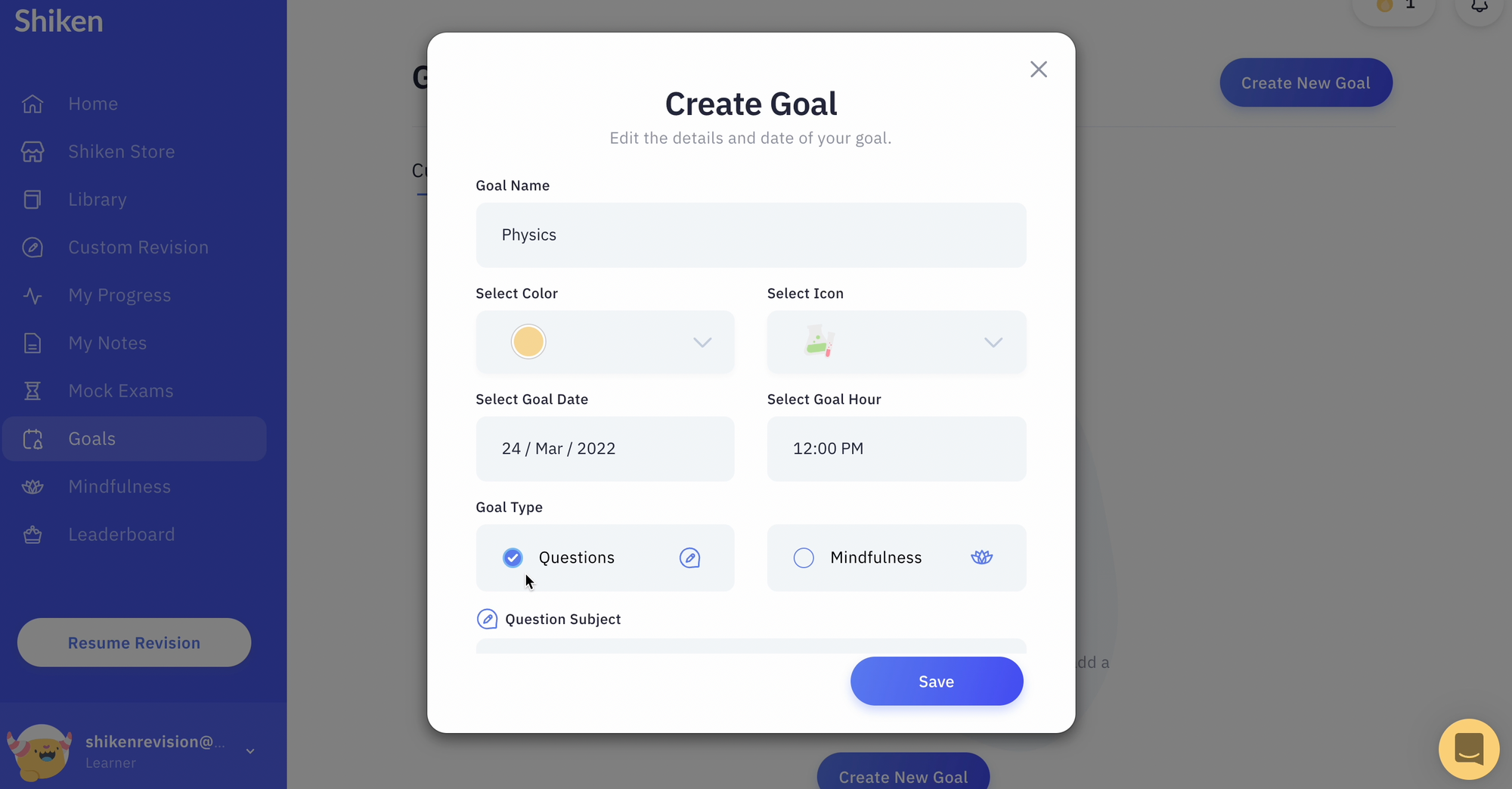How To Make An Effective Exam Revision Timetable - How To Study For Exams
Studying for exams can be super stressful and it can be difficult to know where to start. So in this article I dive into how I structured my revision around exam time to stay focused and organised using an exam revision timetable.
When I studied for exams at school my revision or study periods in the run up to exams were fairly basic. I'd just work through the syllabus in the 6-weeks leading up to the exam and not really have very much structure. At medical school and when sitting postgraduate surgical exams I needed to update this to something that was more focused, time-efficient and just a better way to learn around a busy schedule where there was lots of information that needed to be covered.
-4.png)
The Problem With Traditional Exam Revision Timetables
When I was at school you were usually given 4 or 6 weeks or sometimes longer to study for exams at the end of the term when lectures had covered all the content on the syllabus. What most people did was they then planned out this time to make sure they covered all of the topics on the syllabus that might come up in the exam. Now what most people do when making an exam revision timetable is that they use the traditional method of mapping out a calendar with dates down one column and then they just go through the course syllabus and say I'm going to revise cardiology in this week then respiratory and then anatomy. So they're just working through the syllabus as it's laid out in the course materials. For me when I was using this method I would read though the lecture notes for cardiology and then when I'd read that book chapter I'd tick it off and move onto the next and then do something like respiratory the next week.

When I was using this method I recognised that it was pretty inefficient and I found that there were five main problems that I used to have with this traditional exam timetable method:
So firstly the main problem I had with this method was that it was pretty passive and just optimised for time spent revising rather than any goal around my actual understanding of a topic. So for example if I had a week scheduled to revise heart disease I'd cram in as much as possible and then move on to respiratory. This gave me the fluency effect and bias of thinking that I knew the topic well as I'd "completed" that planned revision week but in actuality I hadn't done a set number of self-test questions and I hadn't really self-assessed my knowledge during that time as the timetable focused on time spent learning rather than my actual understanding of the topic or any real data on my performance when self-testing. By thinking of your revision as a function of time rather than as a function of your ability to recall and understand topics you are leaving yourself open to the fluency effect where you are inefficiently spending time revising but you feel like you are being productive and then at the exam you still struggle because even though you've spent the time revising you don't actually know the topic well enough.
The second issue I encountered was that when creating a standard revision timetable at the start of an exam revision period I found that I couldn't really predict what topics I would be struggling with in say 4-6 weeks time. It kind of required me to predict the future and I ended up just working my way through a generic list of topics in the order they appeared on the syllabus rather than anything personalised to what I found hardest or any focus on high-yield topics that might be tested regularly. Because the timetable wasn't personalised or focused on high-yield topics not only was it inefficient but it was also quite boring as I'd be spending the same time reading over topics that I knew well or weren't likely to be tested as I would on topics that I knew less and were more likely to be tested. The consequence of this is that I'd often get distracted as the volume of information was pretty huge for medicine and then I'd end up playing Tony Hawk's, Legend of Zelda or hanging out with my friends which then put more pressure and stress on getting a topic completed during that week or time period I'd assigned to it. So just sticking with the timetable was a big challenge.
The third issue with this method is a bit of a follow on from points one and two which is that when you have a standard revision timetable planned out and on an excel spreadsheet or in your calendar there is no real way to quickly see what topics you are weakest at and, unless you are doing past-papers and self-test questions and noting your results down somewhere, there is no way to quickly see from the timetable what your actual learning progress is. So for example yes you can tick off that you did a day of revision on a topic in biology but how are you noting down and tracking your actual ability and understanding of that topic. Did you test yourself and get 50% of the questions correct? Did you do a past-paper at the end of the week and score 75%? Where is that actual information on your ability in that topic being highlighted on the traditional revision timetable. Well this is important because for subjects like medicine where there are loads of things to remember you need to be able to come back quickly towards the end of the exam revision period and go back over topics and if it's not obvious what you're weakest at how will you know what to prioritise and focus on.
-4.png)
This leads me into the fourth problem with the traditional time-based revision timetable which is that by setting very basic deadlines like I'm going to learn these three topics tomorrow or I'm going to cover anatomy by the 14th January you're putting unnecessary pressure on yourself when you don't necessarily know how long it's going to take you to revise a topic. So for example you might start out slowly going through neurology only to find that some topics are a bit more complicated than you thought and you only have 2 days left to get through them on your timetable before you need to move on to gastroenterology. So what ended up happening for me was that I'd push back some topics and then end up either not revising them properly or just leaving them out altogether. This was really poor time management on my part and while it's good to set goals and deadlines these need to be SMART goals that are Specific, Measurable, Achievable, Realistic, and Timely in regards to your learning a topic.
The fifth and final problem I had with using a traditional revision timetable is that the actual process of creating the timetable can itself be an exercise in procrastination. I would spend quite a bit of time planning things out, adding dates to a calendar and some of my friends who were a bit more artistic would use sticky notes, wall charts and colourful highlighters to plan out these really intricate revision timetables which meant they were slow to get started and for me these big, complicated revision timetables almost became overwhelming and made me not want to revise at all as there seemed to be so much to get through.
So these are some of the problems that I encountered with traditional revision timetables, traditional revision timetables aren't inherently bad and are definitely better than having no plan at all. But to quote boxer Mike Tyson "Everyone has a plan until they get punched in the mouth" and when I was studying for postgraduate surgical exams around my day job as a surgeon I just didn't have time for creating anything that was complicated and I needed to be efficient and jump into revising around my day job and busy life when I might have an on-call shift or I might need to stay late operating. So I needed something that was much more flexible, efficient and which kept me motivated to revise even if I'd been up all night operating. So let's take a look at the method that I used and then I'll screen share how to do it yourself and then we'll check out some cool tools to help make your revision even more efficient.
Spacing, Interleaving and Testing Revision Timetable (SIT)
The revision timetable and planning system that I used incorporated the best evidence-based learning techniques we've already learned about in this evidence-based learning series namely spacing out your study sessions so that you regularly come back to topics as you begin to forget them which strengthens memory formation. You interleave topics by revising different concepts and topics together to build context and help your brain to better understand the principles behind them and make them more relatable to your existing knowledge. And then finally you revise topics using active recall and testing yourself rather than just passively re-reading or highlighting thing so that you can accurately see how well you know what you are revising.
So what does this look like? Well in contrast to the traditional revision timetable that optimises for time and puts dates down the left column the timetable that I used prioritised topics and my understanding of them and put these down the main left column.

As you'll know from my article on how to study for exams the first thing that I will do when planning my studying is to grab some past papers and the course syllabus and key textbooks and look at what topics are high-yield i.e. they come up frequently at exams. I'll then list these topic areas down in the left hand column with the high yield topics at the top. I'll then go over these and think about which of the topics I need to revise for the exam I know the least well and which terrifies me the most. I'll then move these to the top so that I'm prioritising commonly tested topics that I know the least well.
I'll use google sheets, excel, notion or some other tools to do this but I might also colour code these topics or do a quick self-assessment by jumping into a past paper at the start of my revision period and noting down my score and what topics just blew my mind. This give me a good baseline to work from and as we'll see will help to keep me motivated and my revision gamified as I'm competing with myself to better my score as I interleave and go back over topics at spaced intervals.
So in terms of time and actually adding this to a calendar how does this all fit together? Well the most important thing here is to bring in some data based on how quickly you like to spend learning topics. Everyone is different and provided you are using evidence-based study methods like active recall you'll likely do pretty well but you need to assess how long your own revision process takes for a topic. For example if you love using flashcards how big is your deck for that topic and how quickly do you usually go through them? For me I will use pre-made online question banks like Shiken and past-papers combined with my own self-created active-recall questions. Having sat loads of exams in medicine and surgery and science-subjects I know that if I usually test myself using around 2000-3000 questions or about 100-200 questions per topic area and then go over these and read around them to build context I'll usually get top grades. I also know that it takes me 30 minutes to get through around 20 questions depending on how much consolidation and overlearning I'm doing. I'm starting from the end and working backwards which is one of the key principles of effective exam revision and preparation and, well, pretty much anything in life. I know that to do well at the exam I need to learn everything well, I know to do that what work best for me is doing a set number of questions so I can now break this down into manageable goals for each topic and set SMART goals and dates in my timetable to plan to complete these by.
So back to the timetable. With my topics down a column and the high-yield and weakest topics at the top I'll set a rough weekly and daily plan around my day job and life that takes into account breaks, exercise and socialising to keep me sane and prevent me from burning out and in these blocks of time I'll set goals for completing a number of questions. This is my goal and if I don't hit my question goal by a date I know I'll need to pick it up and do more next time. Rather than aligning to just time spent revising I'm focusing on doing the questions that give me a better idea of how well I know a topic. In this way the timetable is flexible and simple and not overwhelming or creating more work for me.

When revising I'll jump into questions and then note down the date I do them on and use spacing to remind me to go back over topics so that I don't forget them. I'll also note down how well I know something by keeping track of my score when doing questions or just by highlighting topics using a traffic light colouring system based on how well I feel I know a topic after completing a revision session. I'll use some tech like question banks to hack this and save which we'll touch on shortly. So I'll jot down the date that I did a session and add in the score of highlight by colour how well I know that topic. This then helps me to quickly visualise what I need to prioritise next compared to the traditional revision timetable that isn't personalised and where I'd just keep plodding through topics. So now if I come back the next week I can see that I revised anatomy a while ago and am due a spaced revision session but I can also see that I got a good score in anatomy while neurology is red even though I did this more recently so I can immediately see that, for me personally, I need to double down on neurology and do more questions and consolidation so I'm not leaving this till the end and I'm attacking the topics I'm weakest at which should then have most effect on improving my exam score rather than just going back over the things that are easy and that I'm good at. This is a much more focused and efficient way to learn where you are constantly testing and targeting what you are weakest at that is also high-yield to have the most impact on your exam score within your revision time. This also allows you to easily incorporate interleaving since you are moving between topics instinctively when reviewing and coming back to areas you are weakest at which helps to build context and makes it easier for your brain to recall information.
To help with this and make reviewing a habit I will regularly factor in spaced reviews at the end of a revision session or the end of the day or the following morning to go back over what I learned in that session as there is evidence that shows that using a spacing interval of less than 24hrs will prevent the exponential effect of the forgetting curve and help you to learn more effectively.

By the end of my revision period I'm aiming to get through all the questions and go over the questions I got incorrect to master them so that my questions goal is complete and my topics are all green and the majority of questions I've been back over I've gotten correct so that I know I've actually mastered the subject.
The other cool thing about this method is that it doesn't take a huge amount of effort to get started other than mapping topics and jumping into some questions to get a baseline for what is high-yield and what you are weakest at. It's also flexible and goals-based and allowed me to jump in and do maybe 10-20 questions in the library while at work or while waiting between operations in the theatre coffee room. Breaking down large subjects into question goals and topics reduces any stress and the seemingly large volume of work.
Apps and Hacks For Planning Your Revision
As I've touched on already I'll use a few things to help build habits during revision periods.
The first hack here is that while I like google sheets and excel as they are quick and simple there are quite a few helpful automation tools that can save you some time when mapping out a revision timetable. Apps like Notion and Airtable have lighter-weight formulae and templates you can use to help track your study progress and if you like using these they are great tools, just don't go down a rabbit hole of trying to create the "perfect" notion revision habit-tracker as that might be just another way to procrastinate rather than getting down to studying.
My second hack, especially if you are studying for exams at school, is to check out apps like Exam Countdown or Smart Timetable which are designed to remind you of upcoming exams if you are doing lots of exams at the end of a school or college year and which can help you to plan things out further. Again my best advice is to keep things simple and if any tools need loads of setup time they might just be a distraction so have a play and see if they are for you or whether an excel sheet is just as good and a bit easier and quicker.

My third and most important hack is to use question banks which will show you how many questions you've done and your progress and score. If you like flashcards Anki and others can track your progress too. Most subjects will have specific online question banks where you can jump into a ton of questions, select your question type, filter by exactly what questions you want to do and then play through them in a gamified way where you just focus on getting through as many questions as possible. The best ones also have mobile apps and will track your progress in the cloud and show you how you are doing against your peers and people who have done well at the exam you're studying for to keep you on track. While most are paid they are in my opinion as important as buying books and some like Shiken which I'm playing with here also allow you to set daily question goals and exam dates and personalise your learning.

My fourth and final hack is to then make sure you have a good daily or weekly diary planner or calendar system which complements your revision timetable. I use Evernote and my diary to plan out my day and week to ensure I time-block out time for studying around my life, exercise, eating and socialising. This is really important when you're working and studying and I'll dive into a video on my morning routine and how I use my diary for everything from self-development and reflection to gratitude and organising my day in later videos so be sure to hit subscribe to hear about those first.
So to summarize when planning and constructing a revision timetable the method that worked best for me was flexible, focused on measuring and tracking my actual understanding and performance at a specific topic and prioritised high-yield topics that I was weakest at. It didn't need ages to create and avoided the fluency effect where you think you have mastered a topic just because you've spent time going over it passively. The method also naturally incorporated spacing, interleaving and active recall as evidence-based study methods to keep me efficient when learning.
-4.png)


